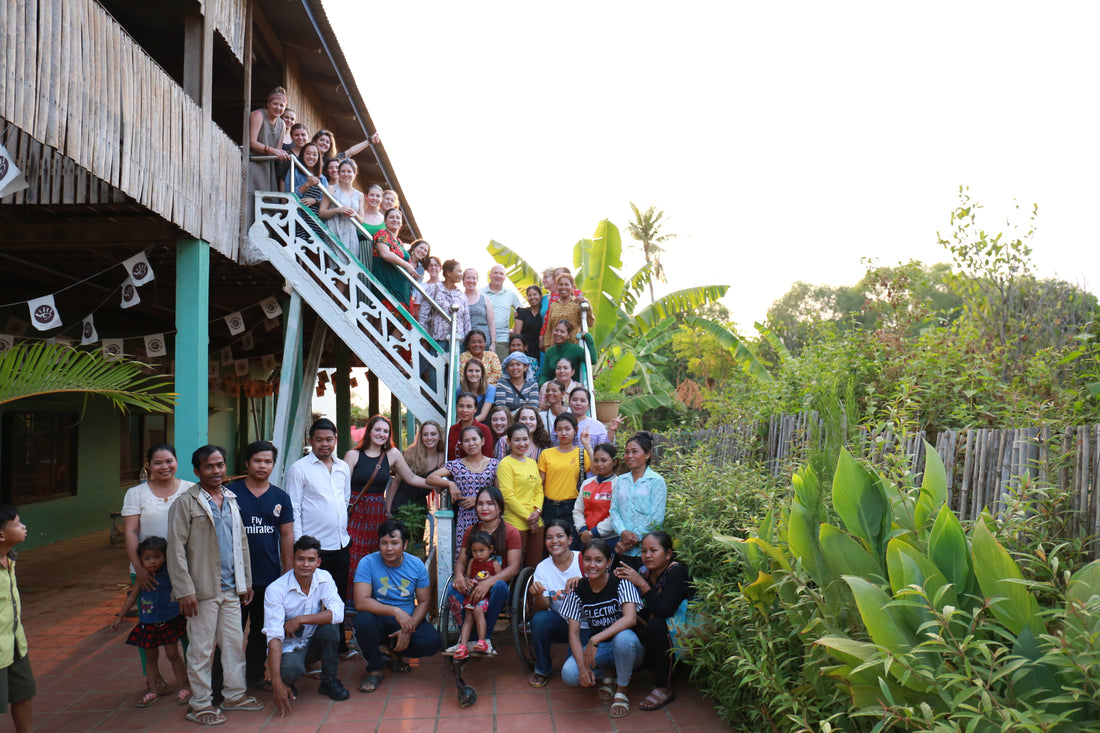At Fair Anita, we work with artisan partners in 9 countries. We’re asked all the time by our customers if we will lead trips to visit these talented women. Well, we finally did it: we brought 20 people from the United State to Cambodia in March 2019. Sharing more here about the thought process around the trip.
Over the last decade or so, there has arisen lively debates over the topic of eco-tourism, voluntourism, and green tourism. I think these programs have both pros and cons: while the volunteers themselves learn much more about the world and themselves and often become better “global citizens”, they are often furthering problematic power dynamics or creating dependency cycles in communities that do more damage than good.
Normally, I am the only one that visits our artisan partners, and I’m visiting them to develop new designs and strengthen our relationships. I’ve developed many of these relationships over the last 10 years, often coming at them from a shared experience of sexual violence as an equalizer. However, I cannot ignore the power dynamics that exist here; me, joining groups as a super tall, white woman with arguably the most powerful passport in the world, as well as the “buyer,” who has the responsibility of making sure our orders are sufficiently sustaining livelihoods of the artisans we work with. I do everything in my power to break down these power dynamics, but so many of them are inevitable, so the best I can do is to be aware of them and how they mold our relationships.
For a while now, I’ve been thinking about how to best share the “heart work” of Fair Anita, as I often feel like the bottle neck, holding all the incredible stories and hugs and dance parties with women around the world. How do we involve our customers and staff in these relationships? How do we make sure our artisan partners are benefiting from these relationships in return?
When I was in Cambodia in April 2018, I was having a conversation with the leader of the artisan cooperative, Anak. She was sharing her dreams for the future of their cooperative: how she would like to see eco-tourism increased in their area, as it means so much economic opportunity for their communities. The one workshop is located almost exactly halfway between Phnom Penh (capital) and Siem Reap (tourist destination for Angkor Wat), so it would be a natural place for tourists to stop and spend a couple days when taking the bus between the two destinations.
Anak quite literally asked me to bring 20 people to Cambodia as “guinea pigs” in their eco-tourism endeavors. She wanted to try out programs like the ones we ended up doing:
- Pony cart rides through the village
- Tours of the artisan workshops
- Dye your own fair trade scarf
- Cambodian noodle making
She also shared with me a dream for growing her organic garden to create additional sources of revenue for the cooperative. She said she needed $5,000 USD to make this happen. She said that she’d like us to volunteer to help implement this garden, as she didn’t want to hire people temporarily that she wouldn’t be able to provide work to in the future. She had already hired the women who would work in the garden long term, but she knew they would need some extra help getting things started. So, under their leadership and guided by them every step of the way, our 20 volunteers worked alongside our Cambodian partners (in the 100 degree heat!) to expand their organic garden, using the donations that we collected with their fees to join the trip.
Fair Anita did not make money from this trip: we charged the amount it cost for food/housing/transportation, plus a transparent $300 donation for the garden. It was important to us that the group was making money from this venture, as they were taking their time and energy to host us.
Our partners in Cambodia were the first to ask us to bring visitors, which is why we ended up there. We don’t want to impose on our artisan partners, and we certainly don’t want to assume that they need our help: they’re the experts of their own communities, and we trust them to do what’s best.
Ultimately, we had a beautiful time together in Cambodia, sharing cultures (especially through dance parties!) and learning from one another. The cooperative said that the artisan partners enjoyed having us there: it was new for artisans, especially those living in rural villages, to get to work alongside foreigners, and it was a motivating learning experience for us all. We have been invited back, and we will take them up on that offer!
To learn more about our trip in Cambodia, check out this video, where I speak about overcoming shared trauma through human-centered systems design:

